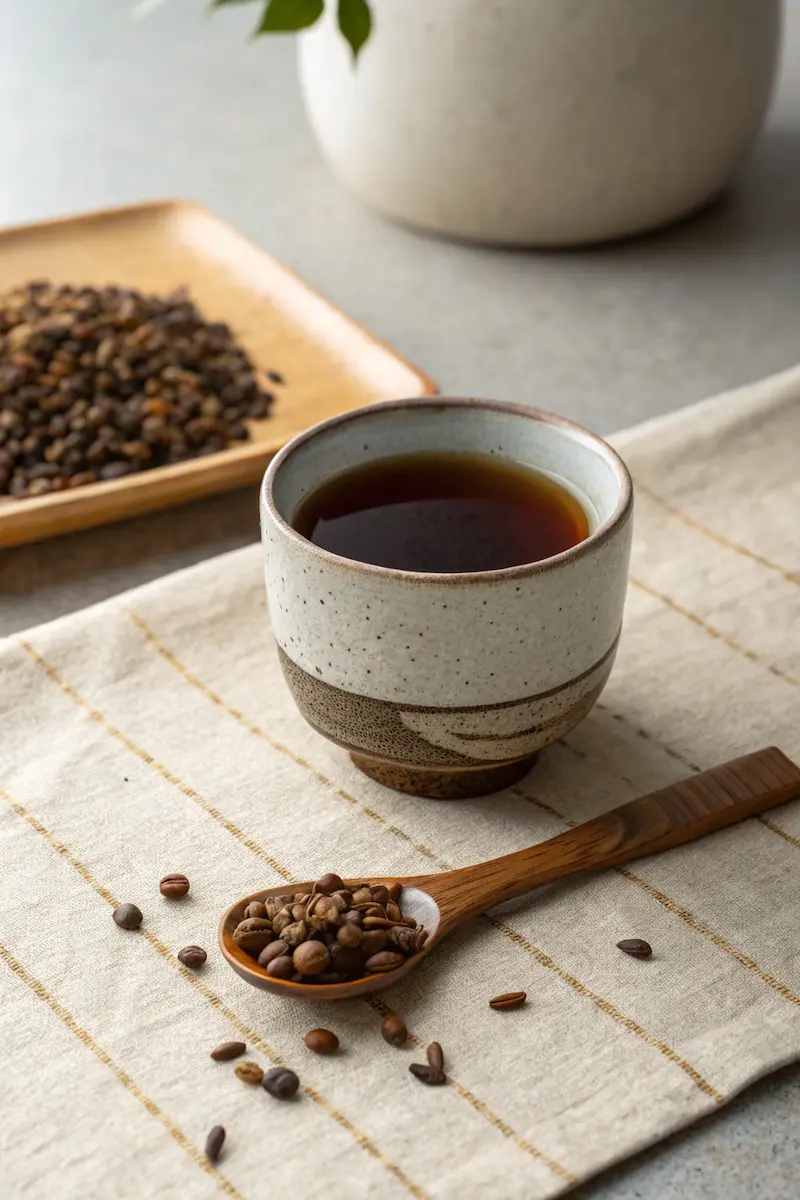Cassia tora tea is an herbal infusion gaining recognition for its earthy flavor and digestive benefits. Made from roasted cassia tora seeds, this caffeine-free tea has been used in traditional medicine for generations. Whether sipped for its cleansing properties or simply enjoyed as a grounding, nutty beverage, cassia tora tea offers a uniquely soothing experience. In this article, we’ll explore the story behind this traditional brew, its preparation methods, and why it’s becoming a staple for tea lovers seeking natural balance and wellness. You’ll also discover customizable tips and serving ideas for bringing cassia tora into your tea routine.
Table of Contents
Cassia Tora Tea – A Detoxifying Herbal Brew with Rich Flavor
An earthy, roasted herbal infusion made from cassia tora seeds, prized for its grounding flavor and digestive benefits.
- Prep Time: 2 minutes
- Cook Time: 15 minutes
- Total Time: 17 minutes
- Yield: 1 serving 1x
- Category: Beverage
- Method: Boiled
- Cuisine: Asian
- Diet: Vegan
Ingredients
- 1 teaspoon roasted cassia tora seeds
- 1½ cups water
- Optional: honey, lemon, ginger, cinnamon, or plant-based milk
Instructions
- Rinse the cassia tora seeds briefly under running water.
- Boil the seeds in 1½ cups water for 10–15 minutes.
- Strain into a cup.
- Optional: Add honey, ginger, cinnamon, or a splash of plant-based milk to taste.
- For a stronger brew, simmer longer or grind seeds before boiling.
- Serve hot or iced for a cooling, digestive twist.
Notes
Cassia tora tea is naturally caffeine-free and traditionally used to support digestion and detox. Adjust steeping time for desired strength.
Nutrition
- Serving Size: 1 cup
- Calories: 5
- Sugar: 0g
- Sodium: 2mg
- Fat: 0g
- Saturated Fat: 0g
- Unsaturated Fat: 0g
- Trans Fat: 0g
- Carbohydrates: 1g
- Fiber: 0g
- Protein: 0g
- Cholesterol: 0mg
Cassia Tora Tea: A Grounding Herbal Classic with Deep Roots
The Story & Intro
Growing up, herbal teas were more than just drinks—they were daily rituals. Among the many remedies my grandmother introduced to me, one stood out for its nutty, almost coffee-like depth: cassia tora tea. Unlike fruity or floral blends, this tea had a roasted warmth, a flavor that felt ancient and healing. It was often served after meals, especially when our stomachs felt unsettled or sluggish. And now, years later, I find myself coming back to it—not just for the nostalgia, but for its gentle strength.
So, what is cassia tora tea? It’s a herbal drink brewed from the roasted seeds of the Cassia tora plant, also known as Senna tora or sicklepod. While not as globally recognized as chamomile or green tea, it holds a respected place in Ayurveda and traditional Chinese medicine. Valued for its cleansing, digestive, and detoxifying effects, cassia tora is often consumed to support liver function and overall gut health.
The flavor is robust yet smooth—slightly bitter with hints of roasted grain and chocolate. Some even compare its depth to caffeine-free coffee alternatives like chicory root tea. Its dark hue, comforting aroma, and grounding taste make it an ideal after-meal beverage or an evening wind-down ritual.
Beyond its health associations, cassia tora tea is remarkably versatile. You can brew it strong like espresso or enjoy a lighter infusion depending on your preference. Add a splash of plant-based milk, a touch of honey, or a few spices like ginger or cinnamon to personalize your cup.
In this article, we’ll walk through the essential components of cassia tora tea: where it comes from, how to prepare it, and how to make it your own. Whether you’re looking to support your wellness or explore new herbal teas, this earthy blend has a lot to offer.
Key Ingredients & Brewing Methods
What Are Cassia Tora Seeds?
The heart of cassia tora tea lies in its unique ingredient: cassia tora seeds. These small, dark brown seeds come from the Cassia tora plant, a legume native to tropical Asia. Though often overlooked in the West, cassia tora has been widely used in traditional medicine systems for centuries, particularly in India and China. Known as “Chakramard” in Ayurveda and “Jue Ming Zi” in Traditional Chinese Medicine, it’s commonly consumed for its digestive and detoxifying properties.
The seeds are typically roasted before brewing, which deepens their flavor and brings out their slightly bitter, earthy notes. Once roasted, the seeds resemble coffee grounds in both appearance and aroma. The roasting process also enhances their active compounds and makes them easier to digest.
Brewing Cassia Tora Tea the Right Way
Brewing cassia tora tea is straightforward, though the exact technique can vary depending on how strong you want the final drink to be. Here’s the most common and reliable method:
Ingredients:
- 1 teaspoon roasted cassia tora seeds
- 1½ cups water
- Optional: honey, lemon, ginger, cinnamon, or milk

Steps:
- Rinse the seeds briefly under running water.
- Boil the seeds in water for about 10–15 minutes.
- Strain into a cup and enjoy as-is, or flavor with sweeteners or spices.
The longer you simmer, the stronger and darker the tea becomes. For a mild cup, steep for just 5–7 minutes. Want more intensity? Let it go longer, similar to how you’d prepare a decoction. You can even let it cool and enjoy it iced for a refreshing digestive drink.
Some people like to grind the roasted seeds before brewing for a bolder extraction—similar to brewing with coarse-ground coffee. This is especially helpful if you’re trying to mimic a caffeine-free espresso alternative.
Customization, Benefits & Serving Suggestions (corrigé avec bons liens)
Customize Your Cup: Natural Pairings and Additions
While cassia tora tea is traditionally consumed plain for its health benefits, it’s also highly adaptable to suit different tastes. The tea’s roasted, mildly bitter flavor can act as a wonderful base for creative flavor infusions.
Here are some favorite ways to personalize your cup:
Add honey for a mellow sweetness that balances bitterness, as suggested in our piece on eucalyptus tea benefits, where natural sweeteners enhance herbal teas beautifully.
A cinnamon stick or a dash of nutmeg creates aromatic depth and warmth—ingredients often used in functional infusions like our drinks to weight loss.
If you’re looking for a digestive edge, a few slices of fresh ginger added during the simmering process can enhance the tea’s soothing effect.
Want something creamier? A splash of almond or oat milk softens the bitterness, especially for those who enjoy dairy-free tea blends.
Prefer it iced? Brew your cassia tora stronger, let it cool completely, and serve over ice with lemon or mint. This method is similar to the chill-focused technique used in our iced butterfly pea flower tea latte.
Cassia tora, much like roasted barley tea, carries a nutty depth that welcomes spice, sweet, and citrus additions with ease.
Gentle Benefits: Why People Drink Cassia Tora Tea
Cassia tora isn’t just a flavorful herbal infusion—it’s long been valued for its wellness-supporting qualities in both Eastern and holistic traditions. Many drink it to promote digestion, liver detox, and internal balance.
Here’s why people choose it:
- It’s often used to support healthy digestion and reduce occasional constipation.
- Traditional medicine recognizes its benefits for liver cleansing and detoxification.
- It has compounds with anti-inflammatory properties, especially for eye care.
- Many enjoy it in the evening for its grounding quality that promotes better sleep.
Scientific research on cassia tora is still developing, but the anecdotal wellness effects are strong and long-standing. In fact, cassia tora tea shares its calm, regulating character with other teas like cassia seed tea, which is well known for similar effects in Korean traditions.

FAQ
What is Cassia tora tea good for?
Cassia tora tea is traditionally consumed for its cleansing and digestive support. It’s especially popular for promoting regular bowel movements, soothing stomach discomfort, and aiding liver detox. In Korean and Ayurvedic practices, this tea is often recommended for daily balance. For similar herbal brews that support wellness, you might also enjoy our cassia seed tea Korean method, which explores a close relative of cassia tora.
What are the benefits of Tora?
Tora—another name for Cassia tora—is known for its gut-soothing, anti-inflammatory, and detoxifying properties. It’s believed to help reduce bloating, support liver function, and even improve eye clarity. While research is still emerging, it’s often included in blends meant for gentle cleansing, much like those discussed in our roundup of drinks to weight loss, where digestive teas play a key role.
Does Cassia tora have caffeine?
No, cassia tora tea is naturally caffeine-free. This makes it a great alternative to traditional teas like black or green tea if you’re looking to avoid stimulants. Its roasted flavor profile offers a grounding experience without the buzz—similar to the satisfying depth you’ll find in roasted barley tea.
What is Tora tea?
Tora tea is simply another term for Cassia tora tea, an herbal infusion made from roasted cassia tora seeds. It’s popular in Asian cultures for its earthy flavor and wellness appeal. Tora tea is commonly sipped after meals or before bed as part of a natural detox and digestive ritual. It shares a purpose and preparation style with teas like white pine needle tea, both prized for their traditional roles in holistic health routines.
Conclusion: A Cup of Calm with Centuries of Wisdom
Cassia tora tea may not be the flashiest herbal drink, but its deep, roasted flavor and natural benefits make it a quiet powerhouse. Whether you’re sipping it to support digestion, unwind in the evening, or simply explore ancient herbal remedies, cassia tora offers a warm and grounding experience. Its versatility—hot or iced, plain or spiced—means it easily fits into modern routines.
This simple tea reminds us that healing and comfort often come from the most humble sources. So brew a cup, take a pause, and enjoy a moment of balance with cassia tora tea.


